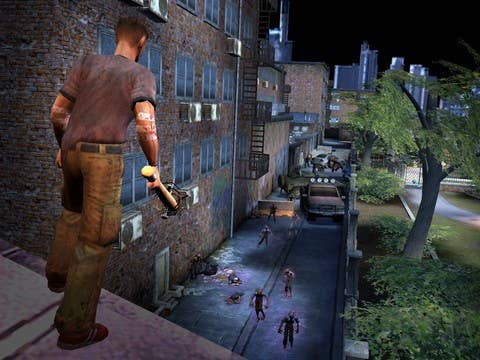Rebellion: Windows 8 suffered tall poppy syndrome
CEO Jason Kingsley on embracing competing formats and what he looks for in a new development platform
Windows 8 hasn't exactly been the most popular release of the year, with many developers lining up to decry the new operating system. But Jason Kingsley, CEO and creative director of UK studio Rebellion, isn't one of those voices. In fact, he's going so far as to support the platform with an open mind where others have been happy to jump straight in and knock it.
In this exclusive interview with GamesIndustry International, Kingsley reveals why he welcomes competing formats, what makes an enticing platform from a development point of view, breaking into the industry and his company's shift to publishing.
I always start from the position that generally speaking, more competition is good in whatever sphere it is, obviously within certain limits. But it's always good to have another platform because it makes each of the hardware providers work a little bit harder, it means we have to modify the games we do to optimise them a little bit for each of the platforms and that's not necessarily a bad thing either.
So my first reaction was 'oh great, that sounds good, it's not just Apple, it's not just Android, it's Microsoft as well.' The negative knee jerk reaction is always intriguing to watch, but I do wonder whether that's only the industry and the general public doesn't really know about it yet and certainly hasn't made a choice and doesn't think anybody is bad or good, it's just another thing for them to potentially buy if they decide to.
I think possibly it's Microsoft's reputation in that everyone thinks they're big and successful and they have to be taken down a notch or two every time they try something. You do kind of wonder whether it's part of human psychology for tall poppies to get their heads cut off, it's kind of a normalising influence of society.
"I think possibly it's Microsoft's reputation in that everyone thinks they're big and successful and they have to be taken down a notch or two every time they try something"
But I don't really know. I think there were some concerns over the business model, over it being a closed shop and over access to the market. People thinking that if it's not a free for all it's obviously going to be evil because we won't be allowed to publish our games on it, or we'll have to pay. I think there were some issues there, which is more to do with communication. There's always a tension between a fully curated system where the person in charge tells you what you can and can't consume, and a Wild West free for all where you download something but in fact it's malware and it's hideous and no one is looking at it at all.
Those are obviously two extremes of the spectrum and I think we kind of got used to a curated system with Microsoft with the Xbox and the PS3. There's a process you have to go through, and that process has it's good points and it has it's bad points. You can't just put out any old project, but that does also mean there are more hoops for people to jump through. It's more difficult for a true indie to get things up on those platforms.
I can understand the concern. I just think it was a bit premature to condemn anything before we know. I'm a great believer in not necessarily having an opinion until you know the details, and then by all means have an opinion.
It did seem to sort of polarise peoples' opinions and I was quite surprised by it. I mean Apple have their approvals process and they have their principles by which they want to work and I guess what they say is 'we're protecting the consumer,' and quite rightly. Even with them doing what they do there's some pretty awful stuff up on the App Store and I think they control the worst excesses of malware. If you go to some of the Android stores it's extraordinary, it's incredible, it's like the Wild West.
"If you go to some of the Android stores it's extraordinary, it's incredible, it's like the Wild West"
So I was kind of surprised when people said 'we should be allowed to publish whatever we like.' It's the same polarisation that people have about the internet being free or some people say 'all games should be free, piracy is a good thing'. The thing is, somebody has to get paid, somebody has to be able to make money out of making these games and therefore you chipping in a little bit of money doesn't hurt.
But I think as usual the reality is probably a balance, somewhere between the opposing views. Too much curation and too much control is probably a bad thing and probably stifles innovation. And not enough probably stifles innovation too because bad things happen as a result of that. So probably, as with most things in life, moderation is the right solution.
It would be a good and educated market, in terms of a market that understands the value of games as an entertainment medium. A big market is a good thing to have, so that's always great, and a user interface for the consumer and a way of getting games which is as seamless as possible. So if someone decides 'hey, that looks cool' they can download it straight away and get it.
And a technology that is relatively straightforward to code for, so custom chips are always awkward because you have to do custom coding. But good hardware, good memory and making it easy to get the best out of it is a good thing. But I'm not a hardware specialist and I'm sure all of these things cost money and that's what it comes down to as well, so making it cost effective for the consumer so that somebody can buy the hardware and then has got some money leftover to buy some software.

I was always think it's good for people to get a break, and breaking into the games industry is quite difficult. Games are made by a lot of highly skilled professionals and sometimes the game jams and outreach opportunities to get new talent into the industry is a good thing. And it helps people get noticed and it helps people to fulfill their dreams and become a games developer, and that's a good thing.
And it's an outreach to the community in a way, and I think some of the bigger hardware manufacturers should be congratulated for doing that sort of thing. That outreach even though they sometimes get jumped up and down on by commentators, I think generally speaking it's done with a good heart and good intent.
"You can trundle along, making modest profits, until as unfortunately has happened with Eurocom, the model shifts and changes"
There's much more middleware, you don't have to learn to programme in the same way that we use to in the old days to actually get anything on screen. We use to say in the old days once you can get a triangle on the screen you're pretty much half way there, it was just getting the damn thing to work in the first place.
I think it's more daunting because in some ways there are more opportunities, but arguably you also need less specialist technical skills to get something on screen. It's just as hard to get a really great game made, or just as hard to get something people will like, because that's the secret sauce, the magic ingredient that is hard to write down. I actually think it's easier to get something up on screen now than it ever has been before.
And also, with digital distribution, nobody actually has to pay for cartridges to be manufactured or pay for cassettes to be duplicated, before selling them in jiffy bags from the small ads in computer magazines.
Typically in our history we've done a lot of work for hire but we've always a done a bit of self publishing. We tried a long time ago with a game called Gunlok which we self-funded and published through various partners. It was a modest success and it was a good return on investment. But we just didn't have the cash available to put too many of those bets down, and then other people wanted us to make games for them, and the work for hire model, from a business perspective, works quite well.
You can trundle along, making modest profits on it, until such times, as unfortunately has happened with Eurocom, the model shifts and changes and then suddenly people don't want another game based on a licence. It'll probably be very workmanlike, it might not set your world on fire, but those opportunities fall away.
So what we've always wanted to do is look at our own IP, create games for ourselves as well, and basically have fewer people in the decision loop so that we can live and die by our own creative decisions. We've made games where we haven't had the kind of creative control we would have ideally liked and for a combination of reasons that has meant that game hasn't been as good as it could have been. Whereas other games, where we've had a lot more say in what goes in and what we do, have generally speaking performed a lot better.
"What we've always wanted to do is look at our own IP and have fewer people in the decision loop so that we can live and die by our own creative decisions"
So it's what they call in business circles a 'modest pivot.' We're one of the last big independent developers left in Europe really, and we've always tried to have a portfolio of approach to our business models, let alone the games that we do. And we're trying lots of different ones out. We've got the traditional console product chugging along very nicely there, with Sniper Elite V2, and we've also got the free-to-play and freemium models on the digital distribution sector.
What I'm really excited about is the coming of age of games, where we're seen as a completely valid an incredibly entertaining mature medium. Very very few people these days think of games as kids' stuff. Basically it's another form of art, another form of media. There are good games and bad games and games not suitable for kids, and I think we're finally leaving the argument that games are for kids behind us and we're challenging other forms of media and influencing them. There are many many movies and the shot structure and narrative structure in them apes that of games. And there are games that obviously want to be movies and vice versa and there almost hybrids now and that's incredibly exciting.
I almost feel like we've lived through the birth of Hollywood from a perspective of games, and now we're seeing it mature.









